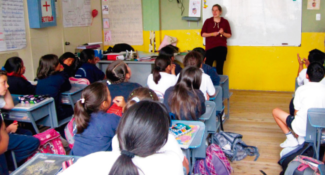VOLUNTEERING
Kindergarten Teaching Volunteer

In 2008 in Ecuador, early education was recognized as part of the educational process that children must fulfill, because during the first years of life, people develop brain skills to think, reason, and learn, which is why it is considered the best age to begin structured cognitive stimulation. The volunteers in the Kindergartens collaborate with the teachers to develop the skills that all children of that age need for their educational future.
In Kindergarten, children from 4 to 5 years old learn the foundation of their cognitive, social, emotional and linguistic capacities that are strengthened during the first years of life. They also develop their motor skills, thoughts, movements, and emotions.
In their earliest years, children’s brains create significant guidelines for the rest of their lives, so it is imperative to develop infrastructure to support learning, medical care, nutrition, and affection to stimulate their cognitive, sensory, intellectual, and social abilities.
Early education helps children discover their identity and promote their confidence; and fosters the construction of self-esteem, adaptiveness, and empathy toward others.
- Assist the teacher in charge of the classroom.
- Supervise children’s activities.
- Prepare didactic material.
- Support the development of each activity.
- Help feed the children.
- Cooperate with recreational activities in classrooms.
- Identify children’s abilities and difficulties.
- Be able to work in a multicultural environment, showing respect for children and their families.
- Respect the cultural diversity and abilities of children.
- Be empathetic with children and their families respecting their customs, abilities, and any areas of disability or complications for learning.
- Have an optimistic, fun, friendly attitude and the ability to motivate others.

